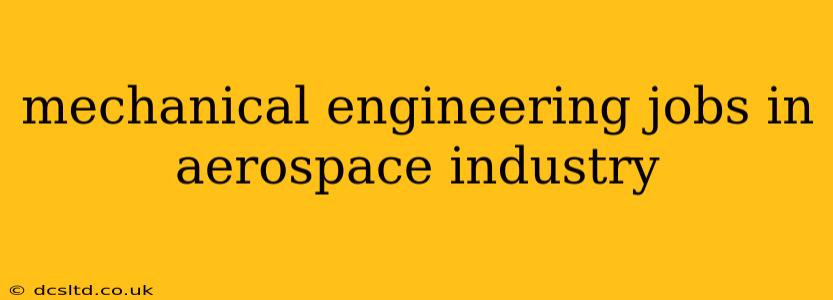The aerospace industry offers a thrilling and challenging career path for mechanical engineers. From designing cutting-edge aircraft to developing innovative spacecraft, the opportunities are vast and varied. This guide explores the diverse roles available, the required skills, and the path to securing a rewarding career in this exciting field.
What are the Main Job Roles for Mechanical Engineers in Aerospace?
Mechanical engineers play a crucial role across various aerospace sub-sectors. Their expertise is vital in designing, developing, testing, and maintaining aircraft, spacecraft, missiles, and related systems. Some common roles include:
-
Aerospace Design Engineer: This role focuses on conceptualizing and designing aircraft and spacecraft components, ensuring they meet performance, safety, and regulatory requirements. This often involves using Computer-Aided Design (CAD) software and advanced simulation techniques.
-
Stress Analyst: These engineers analyze the structural integrity of aerospace vehicles and components under various loading conditions. They utilize finite element analysis (FEA) and other computational methods to ensure designs can withstand the extreme forces encountered during flight.
-
Propulsion Systems Engineer: This specialization involves the design, development, and testing of propulsion systems, including engines, rockets, and fuel systems. A deep understanding of thermodynamics, fluid mechanics, and combustion is essential.
-
Avionics Systems Engineer: This role focuses on the integration of electronic and computer systems into aircraft and spacecraft. Mechanical engineers in this area often work alongside electrical engineers to ensure seamless system operation and reliability.
-
Manufacturing Engineer: These engineers optimize manufacturing processes to ensure the efficient and cost-effective production of aerospace components. They work closely with design engineers and production teams to improve manufacturing techniques and reduce waste.
-
Test Engineer: These engineers plan and execute tests on aerospace components and systems to verify their performance and reliability. This involves designing test procedures, collecting data, and analyzing results to ensure compliance with specifications.
What skills are necessary for mechanical engineering jobs in the aerospace industry?
Beyond a strong foundation in mechanical engineering principles, specific skills are highly valued in the aerospace industry:
-
Proficiency in CAD Software: Software such as SolidWorks, CATIA, and AutoCAD are essential tools for designing and modeling aerospace components.
-
FEA and CFD Expertise: Finite Element Analysis (FEA) and Computational Fluid Dynamics (CFD) are crucial for simulating and analyzing structural performance and aerodynamic behavior.
-
Strong Problem-Solving Skills: Aerospace engineering often involves tackling complex technical challenges, requiring creative and analytical problem-solving abilities.
-
Teamwork and Communication Skills: Aerospace projects are typically large-scale, collaborative endeavors, necessitating effective communication and teamwork skills.
-
Knowledge of Aerospace Regulations: Familiarity with industry standards and regulatory requirements (e.g., FAA regulations) is essential for ensuring safety and compliance.
How can I get a job in aerospace mechanical engineering?
-
Obtain a Relevant Degree: A Bachelor's degree in Mechanical Engineering is the minimum requirement. A Master's degree or PhD can significantly enhance career prospects, especially in specialized areas.
-
Gain Practical Experience: Internships, co-ops, or research projects in the aerospace industry are invaluable for building experience and networking.
-
Develop Specialized Skills: Focus on developing proficiency in CAD software, FEA, and other relevant software tools.
-
Network with Professionals: Attend industry conferences, join professional organizations (e.g., AIAA), and connect with people working in the aerospace field.
-
Build a Strong Resume and Cover Letter: Highlight your relevant skills, experience, and accomplishments in a clear and concise manner.
What are the salary expectations for mechanical engineers in the aerospace industry?
Salaries for mechanical engineers in the aerospace industry vary depending on experience, location, and employer. Generally, aerospace engineering roles offer competitive compensation packages. Entry-level positions typically pay well, and salaries increase significantly with experience and expertise.
What are the career advancement opportunities?
Career advancement in aerospace engineering often involves taking on more responsibility and leadership roles, such as project management, engineering management, or technical leadership positions. Continued professional development and specialized training can open doors to higher-level positions and increased earning potential.
What is the job market outlook for mechanical engineers in aerospace?
The job market for mechanical engineers in the aerospace industry is expected to experience growth in the coming years, driven by ongoing advancements in aircraft and spacecraft technology and increased demand for air travel and space exploration. However, competition for desirable positions can be intense.
What are some of the biggest challenges facing mechanical engineers in the aerospace industry?
Some of the major challenges include:
-
Designing for extreme environments: Aerospace vehicles must withstand extreme temperatures, pressures, and other harsh conditions.
-
Meeting stringent safety regulations: The aerospace industry has incredibly high safety standards, demanding meticulous design and testing.
-
Balancing performance and cost: Developing advanced aerospace technologies often involves managing trade-offs between performance, cost, and weight.
-
Keeping up with technological advancements: The aerospace industry is constantly evolving, requiring engineers to stay abreast of the latest technologies and techniques.
This comprehensive overview provides a strong foundation for understanding the opportunities and challenges within aerospace mechanical engineering. Remember, continuous learning and adapting to the ever-changing landscape of this field are key to a successful and rewarding career.
